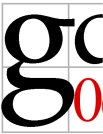Download as PDF, MS Word, or plain text.
Graph Drawing is concerned with the geometric representation of graphs and networks and is motivated by those applications where it is crucial to visualize structural information as graphs. Bridging the gap between theoretical advances and implemented solutions is an important aspect of the conference. Indeed, advances in graph drawing are a key factor in such technological areas as web computing, e-commerce, VLSI circuit design, information systems, software engineering, computational cartography, visual interfaces, bioinformatics, network analysis and networking. Researchers and practitioners working on theoretical and practical aspects of graph drawing are welcome to participate. Human performance studies based on perceptual and cognitive evaluations of graph drawings are encouraged.
Scope
The range of topics that are within the scope of the International Symposium on Graph Drawing includes (but is not limited to):
- Visualization of networks, Web maps, software engineering diagrams, database schemas, chemical structures and molecules
- Graph algorithms
- Geometric graph theory and geometric computing
- Software systems for graph visualization
- Topology and planarity
- Graph theory and optimization on graphs
- Interfaces for interacting with graphs
- Empirical assessment of graph drawing systems
- Task analysis to guide graph drawing
Invited Speakers
Call for Papers, Demos, and Posters
Authors are invited to submit papers describing original research and surveys of theoretical or practical significance to graph drawing. Demonstrations of systems incorporating original and innovative research ideas are also solicited. A system demonstration should include illustrative screen dumps and a description of the system's functionalities. Regular papers and demos must be labeled as either long or short; long papers will be assigned 12 pages in the conference proceedings, and short papers 6 pages.
Submissions of posters in graph drawing and related areas are also solicited. The purpose is to provide a forum for the communication of results (which may appear elsewhere) to the graph drawing community. A poster will be given 2 pages in the conference proceedings. Submission of substantially similar papers or demos to GD 2006 and to other conferences with published proceedings is not allowed.
Instructions for Authors
Each submission must include an indication of its type (paper, demo description, or poster) and contact information for the primary author. For a paper or a demo, an indication about whether it is a regular or a short submission must also be given. Only electronic submissions are allowed. The full extended abstract should not exceed 12 single-spaced pages in LNCS-style. If the authors believe that more details are essential to substantiate the main claims of the paper, they may include a clearly marked appendix that will be read at the discretion of the program committee.
Submissions deviating from these guidelines or from the submission deadline below risk rejection without consideration of their merits. Please see the author information page for technical details.
Graph Drawing Contest
Following the tradition of previous conferences, a graph drawing contest will be held. The anticipated funding for the contest is € 1,000. Details on the contest will be provided on the conference web site.
Important Dates
- Submissions of papers, demos, and posters: June 4, 2006
- Notification of acceptance: July 20, 2006
- Graph Drawing Contest Submissions: September 15, 2006
- Symposium on Graph Drawing: September 18-20, 2006
Proceedings
Accepted submissions will be published in the conference proceedings, which will be included in the Springer-Verlag series Lecture Notes in Computer Science. Final versions of accepted submissions are due at the conference.
Related Events
ALGO 2006 (ETH Zürich, Switzerland): September 11-15, 2006.
Location
Universität Karlsruhe (TH), Forum, Germany.
Program Committee
- Walter Didimo (Univ. Perugia, Italy)
- Vida Dujmovic (Carleton Univ., Canada)
- David Eppstein (UC Irvine, USA)
- Patrick Healy (Univ. Limerick, Ireland)
- Michael Jünger (Univ. Cologne, Germany)
- Michael Kaufmann (Univ. Tübingen, Germany), co-chair
- Stephen Kobourov (Univ. Arizona, USA)
- Yehuda Koren (ATT, USA)
- Xuemin Lin (Univ. New South Wales, Australia)
- Guy Melançon (LIRMM Montpellier, France)
- Takao Nishizeki (Tohoku Univ., Japan)
- Maurizio Patrignani (Univ. Roma III, Italy)
- Bettina Speckmann (TU Eindhoven, Netherlands)
- Geza Toth (Hungar. Acad. Science, Hungary)
- Dorothea Wagner (Univ. Karlsruhe, Germany), co-chair
- Alexander Wolff (Univ. Karlsruhe, Germany)
- David Wood (Univ.Polyt. Catalunya, Spain)
Organizing Committee
- Michael Baur (Univ. Karlsruhe, Germany)
- Lilian Beckert (Univ. Karlsruhe, Germany)
- Michael Kaufmann (Univ. Tübingen, Germany), co-chair
- Martin Siebenhaller (Univ. Tübingen, Germany)
- Dorothea Wagner (Univ. Karlsruhe, Germany), co-chair
Contest Committee
- Christian Duncan (La. Tech), chair
- Gunnar Klau (FU Berlin)
- Stephen Kobourov (Univ. Arizona)
- Georg Sander (ILOG)
Contact Information
The symposium's website is available at http://gd2006.org.
Michael Kaufmann
Wilhelm-Schickard Institut für Informatik
Sand 13
Universität Tübingen
72116 Tübingen, Germany
Phone: +49 7071 / 29 77404, Fax: +49 7071 / 29 5061
Dorothea Wagner
Universität Karlsruhe (TH)
Fakultät für Informatik
ITI Wagner
Box 6980
76128 Karlsruhe, Germany
Phone: +49 721 / 608 3919, Fax : +49 721 / 608 4211

